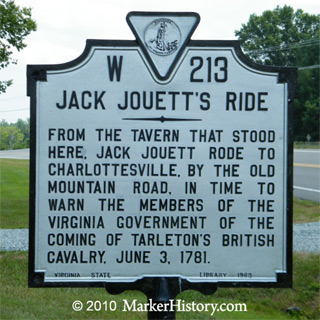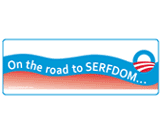We’ve all heard about Paul Revere and his famous ride to warn the colonists that the British were coming. But unless you’re from Virginia the name Jack Jouett probably doesn’t ring any bells. Yet Jouett made a similar ride in the later days of the Revolutionary War that was arguably more crucial to the Patriot’s ultimate victory that Revere’s. And more arduous.
Late on the night of June 3rd, 1781 Jouett, a captain of the Virginia Militia, was asleep on the lawn in front of the “Cuckoo Tavern” when he was suddenly awakened by a large number of British Dragoons; Colonel Banastre Tarleton’s cavalry. Realizing they were headed for a surprise raid on Charlottesville, where the Virginia General Assembly was in session, Jouett quickly saddled and mounted his horse and took off to warn the Patriots that the British were definitely coming!
He first rode to Monticello to warn Thomas Jefferson and then galloped off to Charlottesville. Overall it was a 40 mile ride through tangled Virginia backwoods (by comparison, Revere’s ride was 15 miles, over fairly good roads). AmericanRevolution.org has a recounting of Jouett’s daring accomplishment:
No sooner had the hoofbeats of the British Dragoons faded into the night, when Captain Jouett saddled his horse and plunged into the dense woods. Virginia Dabney wrote in his version of this story in the June, 1928 issue of Scribner’s magazine – “The unfrequented pathway over which this horseman set out on his all-night journey can only be imagined. His progress was greatly impeded by matted undergrowth, tangled bush, overhanging vines and gullies . . . his face was cruelly lashed by tree limbs as he rode forward and scars said to have remained the rest of his life were the result of lacerations sustained from these lowhanging branches.”

A speedy horse, a strong will, and the aid of a full moon gave Captain Jouett a slight advantage. With the first light of dawn on June 4th he arrived at Thomas Jefferson’s famous home, Monticello. He awoke Governor Jefferson and some of the Virginia Legislators who were staying at Monticello. Then, without hesitation, the exhausted Captain turned his horse and galloped to Charlottesville to spread the alarm. The Assemblymen at Charlottesville scattered, but only after voting to reconvene on June 7th at Staunton.
How close was Jefferson’s escape?
Henry Randall, in his book, THE LIFE OF THOMAS JEFFERSON, reported that while Jefferson was on the lawn of Monticello, Captain of Dragoons McLeon was actually in the house.
Captain Jack Jouett’s heroism was acknowledged by the Virginia Assembly , who presented him with a brace of silver mounted pistols and a jeweled sword.
And how significant was Jack Jouett’s ride?
Stuart G. Gibbony, President of the Thomas Jefferson Memorial Foundation said of Jack Jouett in 1926: “But for Captain Jack Jouett’s heroic ride, there would have been no Yorktown and the Revolutionists would have been only unsuccessful rebels.”
Thank-you Jack Jouett! ~ Another courageous patriot to whom we Americans owe a debt of gratitude for our freedoms.
~~~~~~~~~~~~~~~~
“Let the American youth never forget, that they possess a noble inheritance,
bought by the toils, and sufferings, and blood of their ancestors; and capacity, if
wisely improved, and faithfully guarded, of transmitting to their latest posterity
all the substantial blessings of life, the peaceful enjoyment of liberty,
property, religion, and independence.”
~ Joseph Story, Commentaries on the Constitution, 1833 ~
~~~~~~~~~~~~~~~~
Related:
Captain Jack Jouett’s Ride to the Rescue ~ at Colonial Williamsburg’s website
Jack Jouett House Historic Site ~ Versailles, Kentucky




